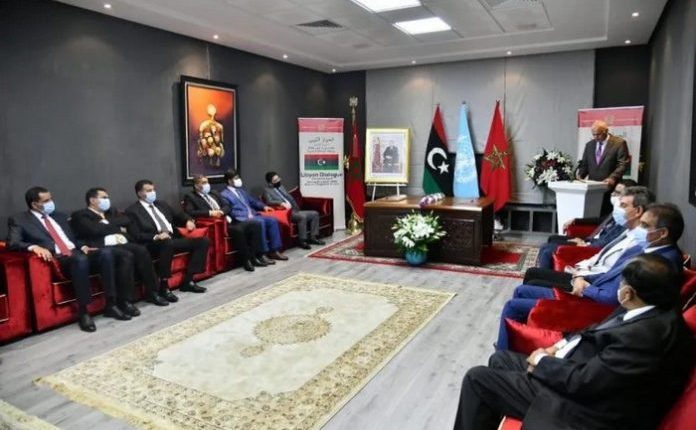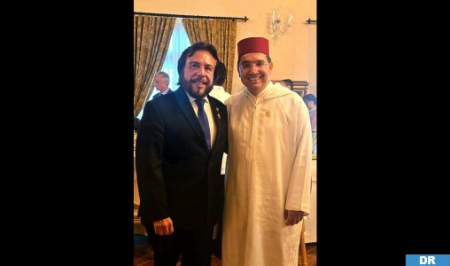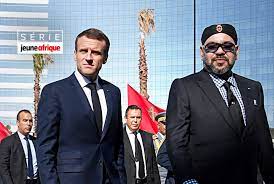Several countries have joined their voices to international and regional organizations to commend Morocco for its facilitation efforts in the settlement process of the Libyan crisis.
The United Nations, through the Secretary-General’s spokesperson, Stéphane Dujarric, expressed thanks to Morocco for its efforts to facilitate compromises on electoral laws between Libyan parties convening in Bouznika.
The Libyan joint committee of the Libyan House of Representatives and the High Council of State (6+6) held a two-week meeting in the Moroccan city of Bouznika that was crowned Tuesday night by an agreement on the rules of the upcoming presidential and parliamentary elections due by end of this year.
Dujarric said at the daily briefing Wednesday “We’ve taken note of the agreement that was reached by the 6+6 Committee. We did provide some expertise, technical expertise, to support the committee throughout the process…the committee members are really commended for their efforts.”
“And we obviously, we thank Morocco for facilitating these efforts,” Dujarric said.
The United Nations Support Mission in Libya (UNSMIL) on its part thanked Morocco for hosting the Libyan 6+6 Committee in Bouznika (May 22 to June 6), which reached a compromise on the electoral laws.
In a statement, the Mission expressed its appreciation for the efforts of the 6+6 Committee, which was mandated by the Libyan House of Representatives and the Libyan Council of State to draft the electoral laws, and thanked the Government of the Kingdom of Morocco for hosting the Committee.
UNSMIL recognized that “important elements of the electoral laws and related issues require the participation and support of a wide range of Libyan institutions, representatives of civil society, including women and youth, and political and security actors in order to enable inclusive, credible and successful elections.”
The Mission called on all Libyan actors to work in a spirit of compromise to resolve all outstanding issues and create a more secure and conducive environment for the holding of elections in 2023, while reaffirming its commitment, in accordance with its mandate, to the holding of “transparent, inclusive and credible elections that will allow the Libyan people to freely choose their representatives and renew the legitimacy of the country’s institutions.”
The African Union (AU) also congratulated this Thursday Morocco for hosting the joint 6+6 committee and for its facilitation efforts.
“I congratulate the Kingdom of Morocco for its facilitation,” wrote AU Commission Chairman Moussa Faki Mahamat in a tweet.
The Chairman of the AU Commission also welcomed the agreement reached by the committee.
In the same vein, Switzerland and The Netherlands have welcomed in tweets by their respective ambassadors to Rabat as “very positive” Morocco’s commitment to a peaceful political transition in Libya following the meeting of the 6+6 Joint Committee, which reached a compromise on the laws governing the presidential and parliamentary elections.
Meanwhile, the Yemeni Foreign Ministry released a statement commending the efforts made by Morocco to ensure the success of this inter-Libyan dialogue and to reach these compromises.
The statement renewed Yemen’s support for any effort likely to realize the Libyan people’s aspirations to security, stability and development.
The draft electoral laws agreed upon by the joint committee will be referred in the few coming days to the Libyan House of Representatives and High Council of State for final endorsement.
During the closing ceremony of the meetings, Moroccan foreign minister Nasser Bourita said the Bouzkina agreement is an important forward step in the process of finding a lasting and peaceful solution to the Libyan crisis, noting that members of the joint committee have accomplished their mission.
Morocco is convinced that elections are the only way to solve the Libyan crisis, said Bourita, affirming that the electoral process cannot succeed without the involvement of all Libyans and that the solution will come only from the Libyans.
For his part, HoR member Jalal Shuwehdi thanked Morocco for hosting and supporting this new round of inter-Libyan dialogue to end crisis and violence rocking his country.
High State Council member Omar Abu Lifa said the joint committee has agreed upon all points related to electoral law which needs now to be approved by the Parliament in order to hold these long-delayed elections prolonging the country’s crisis and violence that are affecting regional peace and stability.



